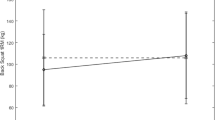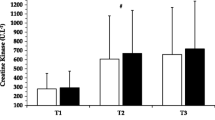Abstract
The effect of 42 g of protein ingested pre- and post-exercise on recovery from an acute resistance exercise session was examined in 15 male strength/power athletes who were randomly divided into a supplement (SUP) or placebo (PL) group. Subjects reported to the Human Performance Laboratory (HPL) on four separate occasions (T1–T4). Maximal strength [one repetition-maximum (1-RM)] testing was performed during T1. During T2 subjects performed four sets of ten repetitions at 80% of their 1-RM in the squat, dead lift and barbell lunge exercises with 90 s of rest between each set. Blood draws occurred at baseline (BL), immediate and 15 min post-exercise to determine testosterone, cortisol and creatine kinase (CK) concentrations. Subjects reported back to the HPL 24 (T3) and 48 h (T4) post-exercise for a BL blood draw and to perform four sets of ten repetitions with 80% of 1-RM for the squat exercise only. No differences in the number of repetitions performed in the squat exercise were seen between the groups at T2. Relative to T2, PL performed significantly (P < 0.05) fewer repetitions than SUP at T3 and T4 (−9.5 ± 5.5 repetitions vs. −3.3 ± 3.6 during T3, respectively, and −10.5 ± 8.2 repetitions vs. −2.3 ± 2.9 repetitions during T4, respectively). No differences in hormonal measures were seen between the groups. CK concentrations were significantly (P < 0.05) elevated at T3 for both groups, but continued to elevate (P < 0.05) at T4 for PL only. No significant group differences were noted for CK at any time point. Results indicate that a proprietary protein SUP consumed before and after a resistance training session significantly contributes to improvements in exercise recovery 24 and 48 h post-exercise.




Similar content being viewed by others
References
Adlercreutz H, Harkonen M, Kuoppasalmi K, Huhtaniemi I, Tikanen H, Remes K, Dessypris A, Karvonen J (1986) Effect of training on plasma anabolic and catabolic steroid hormones and their response during physical exercise. Int J Sports Med 7(Suppl 1):227–228. doi:10.1055/s-2008-1025798
Anderson LL, Tufekovic G, Zebis MK, Crameri RM, Verlaan G, Kjaer M, Suetta C, Magnusson P, Aaraard P (2005) The effect of resistance training combined with timed ingestion of protein on muscle fiber size and muscle strength. Metabolism 54:151–156. doi:10.1016/j.metabol.2004.07.012
Bassit RA, Sawada LA, Bacurau RF, Navarro F, Costa Rosa LF (2000) The effect of BCAA supplementation upon the immune response of triathletes. Med Sci Sports Exerc 32:1214–1219. doi:10.1097/00005768-200007000-00005
Beaven CM, Gill ND, Cook CJ (2008) Salivary testosterone and cortisol responses in professional rugby players after four resistance exercise protocols. J Strength Cond Res 22:426–432
Beck TW, Housh TJ, Johnson GO, Schmidt RJ, Housh DJ, Coburn JW, Malek MH, Mielke M (2007) Effects of a protease supplement on eccentric exercise-induced markers of delayed-onset muscle soreness and muscle damage. J Strength Cond Res 21:661–667. doi:10.1519/R-21016.1
Biolo G, Tipton KD, Klein S, Wolfe RR (1997) An abundant supply of amino acids enhances the metabolic effect of exercise on muscle protein. Am J Physiol Endocrinol 273:E122–E129
Boirie Y, Dangin M, Gachon P, Vasson MP, Maubois JL, Beaufrere B (1997) Slow and fast dietary proteins differently modulate postprandial protein accretion. Proc Natl Acad Sci USA 94:14930–14935. doi:10.1073/pnas.94.26.14930
Borsheim E, Cree MG, Tipton KD, Elliot TA, Aarsland A, Wolfe RR (2004) Effect of carbohydrate intake on net muscle protein synthesis during recovery from resistance exercise. J Appl Physiol 96:674–678. doi:10.1152/japplphysiol.00333.2003
Clarkson PM, Nosaka K, Braun B (1992) Muscle function after exercise-induced muscle damage and rapid adaptation. Med Sci Sports Exerc 24:512–520
Cribb PJ, Hayes A (2006) Effects of supplement timing and resistance exercise on skeletal muscle hypertrophy. Med Sci Sports Exerc 38:1918–1925. doi:10.1249/01.mss.0000233790.08788.3e
Dill DB, Costill DL (1974) Calculation of percentage changes in volume of blood, plasma and red cells in dehydration. J Appl Physiol 37:247–248
Dixon CB, Robertson RJ, Goss FL, Timmer JM, Nagle EF, Evans RW (2006) The effect of acute resistance exercise on serum malondialdehyde in resistance-trained and untrained collegiate men. J Strength Cond Res 20:693–698. doi:10.1519/R-15854.1
Elliot TA, Cree MG, Sanford AP, Wolfe RR, Tipton KD (2006) Milk ingestion stimulates net muscle protein synthesis following resistance exercise. Med Sci Sports Exerc 38:667–674. doi:10.1249/01.mss.0000210190.64458.25
Esmarck B, Andersen JL, Olsen S, Richter EA, Mizuno M, Kjaer M (2001) Timing of postexercise protein intake is important for muscle hypertrophy with resistance training in elderly humans. J Physiol 535:301–311. doi:10.1111/j.1469-7793.2001.00301.x
Häkkinen K, Pakarinen A (1993) Acute hormonal responses to two different fatiguing heavy-resistance protocols in male athletes. J Appl Physiol 74:882–887
Hoffman JR (2006) Norms for fitness, performance, and health. Human Kinetics, Champaign, pp 27–40
Hoffman JR, Ratamess NA, Ross R, Shanklin M, Kang J, Faigenbaum AD (2008a) Effect of a pre-exercise ‘high-energy’ supplement drink on the acute hormonal response to resistance exercise. J Strength Cond Res 22:874–882
Hoffman JR, Ratamess NA, Ross R, Kang J, Magrelli J, Neese K, Faigenbaum AD, Wise JA (2008b) β-Alanine and the hormonal response to exercise. Int J Sports Med 29(12):952–958
Hulmi JJ, Kovanen V, Selanne H, Kraemer WJ, Häkkinen K, Mero A (2008) Acute and long-term effects of resistance exercise with or without protein ingestion on muscle hypertrophy and gene expression. Amino Acids (published on line July)
Kraemer WJ, Marchitelli L, Gordon S, Harmon E, Dziados J, Mello R, Frykman P, McCurry D, Fleck S (1990) Hormonal and growth factor responses to heavy resistance exercise protocols. J Appl Phys 69:1442–1450
Kraemer WJ, Gordon SE, Fleck SJ, Marchitelli LJ, Mello R, Dziados JE, Friedl K, Harman E, Maresh C, Fry AC (1991) Endogenous anabolic hormonal and growth factor responses to heavy resistance exercise in males and females. Int J Sports Med 12:228–235. doi:10.1055/s-2007-1024673
Kraemer WJ, Ratamess NA, Volek JS, Häkkinen K, Rubin MR, French DN, Gómez AL, McGuigan MR, Scheett TP, Newton RU, Spiering BA, Izquierdo M, Dioguardi FS (2006) The effects of amino acid supplementation on hormonal responses to resistance training overreaching. Metab Clin Exp 55:282–291
Kraemer WJ, Hatfield DL, Spiering BA, Vingren JL, Fragala MS, Ho JY, Volek JS, Anderson JM, Maresh CM (2007) Effects of a multi-nutrient supplement on exercise performance and hormonal responses to resistance exercise. Eur J Appl Physiol 101:637–646. doi:10.1007/s00421-007-0535-3
Nagasawa T, Hirano J, Yoshizawa F, Nishizawa N (1998) Myofibrillar protein catabolism is rapidly suppressed following protein feeding. Biosci Biotechnol Biochem 62:1932–1937. doi:10.1271/bbb.62.1932
Negro M, Giardina S, Marzani B, Marzatico F (2008) Branched-chain amino acid supplementation does not enhance athletic performance but affects muscle recovery and the immune system. J Sports Med Phys Fit 48:347–351
Phillips SM, Tipton KD, Ferrando AA, Wolfe RR (1999) Resistance training reduces the acute exercise-induced increase in muscle protein turnover. Am J Physiol Endocrinol Metab 276:E118–E124
Rasmussen BB, Tipton KD, Miller SL, Wolf SE, Wolfe RR (2000) An oral essential amino acid-carbohydrate supplement enhances muscle protein anabolism after resistance exercise. J Appl Physiol 88:386–392
Rawson ES, Conti MP, Miles MP (2007) Creatine supplementation does not reduce muscle damage or enhance recovery from resistance exercise. J Strength Cond Res 21:1208–1213. doi:10.1519/R-21076.1
Roberts WL, McMillin GA, Burtis CA, Burns DE (2008) Reference information for the clinical laboratory. In: Burtis CA, Ashwood ER, Bruns DE (eds) Tietz fundamentals of clinical chemistry, 6th edn. Saunders Elsevier, St Louis, pp 836–873
Roti S, Iori E, Guiducci U, Emanuele R, Robuschi G, Bandini P, Gnudi A, Roti E (1981) Serum concentrations of myoglobin, creatine phosphokinase and lactic dehydrogenase after exercise in trained and untrained athletes. J Sports Med 21:113–118
Rowlands DS, Thorp RM, Rossler K, Graham DF, Rockell MJ (2007) Effect of protein-rich feeding on recovery after intense exercise. Int J Sport Nutr Exerc Metab 17:521–543
Rowlands DS, Rossler K, Thorp RM, Graham DF, Timmons BW, Stannard SR, Tarnopolsky MA (2008) Effect of dietary protein content during recovery from high-intensity cycling on subsequent performance and markers of stress, inflammation, and muscle damage in well-trained men. Appl Physiol Nutr Metab 33:39–51. doi:10.1139/H07-136
Shimomura Y, Yamamoto Y, Bajotto G, Sato J, Murakami T, Shimomura N, Kobayashi K, Mawatari K (2006) Nutraceutical effects of branched-chain amino acids on skeletal muscle. J Nutr 136:529S–552S
Thomas C, Perrey S, Ben Saad H, Delage M, Dupuy AM, Cristol JP, Mercier J (2007) Effects of a supplementation during exercise and recovery. Int J Sports Med 28:703–712. doi:10.1055/s-2007-965021
Tipton KD, Wolfe RR (2001) Exercise, protein metabolism, and muscle growth. Int J Sport Nutr Exerc Metab 11:109–132
Tipton KD, Ferrando AA, Phillips SM, Doyle D Jr, Wolfe RR (1999) Postexercise net protein synthesis in human muscle from orally administered amino acids. Am J Physiol Endocrinol 276:E628–E634
Tipton KD, Rasmussen BB, Miller SL, Wolf SE, Owens-Stovall SK, Petrini BE, Wolfe RR (2001) Timing of amino acid-carbohydrate ingestion alters anabolic response of muscle to resistance exercise. Am J Physiol Endocrinol Metab 281:E197–E206
Tipton KD, Elliot TA, Cree MG, Wolf SE, Sanford AP, Wolfe RR (2004) Ingestion of casein and whey proteins result in muscle anabolism after resistance exercise. Med Sci Sports Exerc 36:2073–2081. doi:10.1249/01.MSS.0000147582.99810.C5
Tipton KD, Elliot TA, Cree MG, Aarsland AA, Sanford AP, Wolfe RR (2007) Stimulation of net muscle protein synthesis by whey protein ingestion before and after exercise. Am J Physiol Endocrinol Metab 292:E71–E76. doi:10.1152/ajpendo.00166.2006
van Loon LJC (2007) Application of protein or protein hydrolysates to improve postexercise recovery. Int J Sport Nutr Exerc Metab 17:S104–S117
Wilkinson SB, Tarnopolsky MA, Macdonald MJ, Macdonald JR, Armstrong D, Phillips SM (2007) Consumption of fluid skim milk promotes greater muscle protein accretion after resistance exercise than does consumption of an isonitrogenous and isoenergetic soy-protein beverage. Am J Clin Nutr 85:1031–1040
Acknowledgments
This study was supported by IDS Sports (Oviedo, FL, USA).
Author information
Authors and Affiliations
Corresponding author
Rights and permissions
About this article
Cite this article
Hoffman, J.R., Ratamess, N.A., Tranchina, C.P. et al. Effect of a proprietary protein supplement on recovery indices following resistance exercise in strength/power athletes. Amino Acids 38, 771–778 (2010). https://doi.org/10.1007/s00726-009-0283-2
Received:
Accepted:
Published:
Issue Date:
DOI: https://doi.org/10.1007/s00726-009-0283-2




